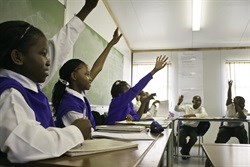






Jay Kloppenberg, Founder and CEO of African School for Excellence says, "Despite significant efforts from both the public and private sector, education in South Africa still has much to be desired. This stunts scholars' future job opportunities as well as the country's short and long-term economic growth and prosperity."
He says among fundamental issues, the quality of teaching and cost of education for everyday South Africans remain top priorities. "Otherwise children from homes who can't afford private education will continue to receive sub-standard education. This simply perpetuates the problem."
To address this, Kloppenberg successfully launched African School for Excellence in Tsakane, a township on Johanneburg's East Rand, in January 2013 after a successful pilot in Accra, Ghana. At 60% less than the cost of a government school (tuition costs R200 per month per scholar), in 2014 its 170 scholars out-performed local and British peers in maths and English. In the recent Annual National Assessment (ANA) exams - for instance, a DBE initiative that tests numeracy and literacy performance between Grades 1 and 9 - its Grade 8 scholars exceeded the national averages of Grade 9 scholars in English Home Language (HL) and Mathematics by 15.9% and 35% respectively. And on the CIE Cambridge Primary Checkpoint - an international yardstick for maths, science and English performance - its Grade 7s performed similarly; after just nine months at the school, they outdid their British peers in both maths and English.
Employing the UK curriculum, Cambridge International Examinations (CIE), the not-for-profit school is an alternative to education in South Africa. Its scholars - who will matriculate with five subjects of Maths, English, History, Science and isiZulu in 2018 - are groomed to be university-ready both in South Africa and abroad.
"Besides developing academic prowess, we cultivate young minds to be independent thinkers, to challenge the norm and to be conscious of their role and responsibility within their community and country," explains Kloppenberg.
The school achieves this by using a peer-based learning model. Simply put, it sees the scholars as teachers and the teachers as highly skilled facilitators. "By encouraging peers to tackle problems together, they develop organising and planning skills, work collaboratively with others, give and receive feedback and evaluate their own learning," explains Kloppenberg.
And while currently only the Tsakane school exists, African School for Excellence has proven itself and is replicable. "Our goal is to create a self-sustaining network of independent schools across South African townships within the next 10 years. The first step in achieving this is moving our existing school to a permanent site in Tsakane in January 2015, which we have bought, and enrolling a new year of 120 scholars in Grade 7."
But there is caveat, concludes Kloppenberg, "African School for Excellence is not a silver bullet for education. It's an alternative, proven model that we believe - by collaborating with Government and corporate South Africa - has the potential to address critical issues impacting the next generation's education and country's economic future by 2025."
For more information about African School for Excellence visit www.ase.org.za.